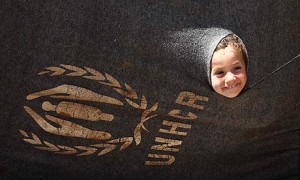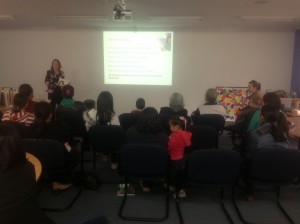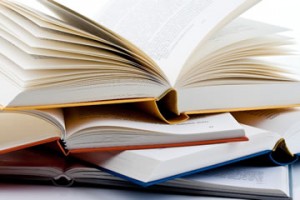| During the Refugee Week, there are numerous activities organised to celebrate the courage, resilience, strength and contributions of the people of refugee background.
Forum on parenting issues and child protection: Friday 14 June, Adelaide Guest speaker from Families SA and participants from various African communities. Coordinated by SA Refugee Week Committee. Details: 1.00pm-3.00pm; Migrant Resource Centre of South Australia basement, 59 King William Street, Adelaide. Contact 08 8217 9520 or valerie@accsa.com.au. |
| Cultural night in the Riverland: Saturday 15 June, Renmark
A night of music, food and festivity celebrating the wonderful contribution of refugee communities to the Riverland and Australia. Coordinated by SA Refugee Week Committee. Details: 5.00pm-9.00pm; Renmark Institute, 54 Ral Ral Avenue, Renmark. Contact Danyon De Buell on 0409 102 195 or riverland.mrcsa@gmail.com. |
|
Refugees and Australia 1972-2012: Sunday 16 June to Saturday 22 June, Adelaide Exhibition tracing Australia’s responses to refugees and asylum seekers over the last forty years. Coordinated by the SA Refugee Week Committee. Details: 10.00am-5.00pm; Migration Museum, 82 Kintore Avenue, Adelaide. Contact Mandy Paul on 0447 203 859 and mpaul@history.sa.gov.au. |
|
Taking Action: Sunday 16 June, Adelaide Refugees and Australia 1972-2012 exhibition. Hear from community organisations about support for refugees. Includes afternoon tea. Coordinated by SA Refugee Week Committee. Details: 2.00pm-4.00pm; Migration Museum, 82 Kintore Avenue, Adelaide. Contact Allison Russell on 08 8203 9891 or 0416 139 848. |
| Volleyball Tournament: Sunday 16 June, Adelaide
Volleyball tournament between Middle Eastern community members and broader clubs. Coordinated by SA Refugee Week Committee. Details: 3.00pm-5.00pm; Christian Brothers College, 214 Wakefield Street, Adelaide. Contact Hussain Razaiat on 08 8217 9523 or admin@meccsa.com.au. |
| Information Display for Refugee Week: Monday 17 June to Friday 21 June (closed Wednesday), Adelaide
Display and information about Refugee Week and the services supporting refugees in South Australia. Coordinated by SA Refugee Week Committee. Details: 10.00am-4.00pm; Ground Floor, 81-97 Grenfell Street, Adelaide. Contact Shannon Peake on 08 8303 0590 or info@wis.sa.gov.au. |
|
Images of Hope – an Exhibition from the ELS Community: Monday 17 June to Friday 21 June, Adelaide Paintings, photos, video clips and drawings, lunchtime performances by musicians and dancers. Coordinated by SA Refugee Week Committee. Details: 9.00am-4.00pm; Anne Beaumont Library, Level 4, 127 Rundle Mall, Adelaide. Contact Margaret Gunn on 08 8226 6765 or margaret.gunn@tafesa.edu.au. |
| Launch of SA Refugee Week: Monday 17 June, Adelaide
Includes Migrant Resource Centre of SA 30th anniversary publication by His Excellency Rear Admiral Kevin Scarce AC CSC RANR, Governor of South Australia and launch of the Youth Poster Exhibition and Awards by the Hon. Jennifer Rankine, MP, Minister for Education and Child Development and Minister for Multicultural Affairs. Coordinated by SA Refugee Week Committee. Details: 2.30pm-4.00pm; Kerry Packer Civic Gallery at the Hawke Centre, University of SA, City West Campus, Hawke Building, Level 3, 50-60 North Terrace, Adelaide. Contact Matti Spellacy on 08 8217 9510 or admin@mrcsa.com.au. |
| Restoring Hope: Tuesday 18 June, Noarlunga Centre
An opportunity to hear the stories from people of refugee backgrounds, followed by lunch. Coordinated by SA Refugee Week Committee. Details: 10.30am; Hopgood Theatre, Ramsay Place, Noarlunga Centre. Contact Briony Gorton on 08 8384 0697 or brigor@onkaparinga.sa.gov.au. |
| Sharing the Journey: Tuesday 18 June and Thursday 20 June, Adelaide
Speakers will share their experiences with TAFE students. Coordinated by SA Refugee Committee. Details: 9.30am-12.30pm; Adelaide City TAFESA Campus, 120 Currie Street, Adelaide. Contact Pam Wright on 08 8207 8481 or pamela.wright2@tafesa.edu.au. |
| Have fun, learn and understand one another: Tuesday 18 June, Adelaide
Enjoy entertainment and share cultural foods and stories by refugees. Tour Parliament House with Ms Rachel Sanderson MP, Member for Adelaide. Coordinated by the SA Refugee Committee. Details: 11.00am-3.00pm; Muslim Women’s Association of SA, Level 4, 182 Victoria Square, Adelaide. Contact Shaista Kalaniya on 08 8212 0800 or admin@mwasa.org.au. |
| Stories of Hope – FUSE mentoring: Tuesday 18 June, Adelaide
Hear inspiring stories of hope from volunteers and refugees involved in the Fuse Mentoring Program. Coordinated by the SA Refugee Week Committee. Details: 7.00pm-8.30pm; Box Factory Community Centre, 59 Regent Street South, Adelaide . Contact Bryan Hughes on 0466 776 501 or bhughes@baptistcaresa.org.au. |
| A Refugee’s Journey: Tuesday, 18 June, Marion
John Mugabushka from Legal Services SA will share the experiences of African refugees prior to arrival in Australia as well as the challenges as they adapt to a new life in Australia. Details: 1.30pm-3.30pm; Cooinda Neighbourhood Centre, 245 Sturt Road, Marion. Contact Melanie Kazerani on 08 8375 6704 or melanie.kazerani@marion.sa.gov.au. |
| Friendship Cup: Wednesday 19 June, Athelstone
Enjoy a friendly soccer match between Adelaide Secondary School of English students and St Ignatius students. Coordinated by the SA Refugee Week Committee. Details: 1.00pm-2.00pm; Saint Ignatius College, 2 Manresa Court, Athelstone. Contact Kouv Chang on 0417 850 814 or kouv.chang@sa.gov.au. |
| Festival of Languages: Thursday 20 June, Torrensville
Students and staff will share with each other their languages and cultures through interactive workshops, singing and dancing. Coordinated by the SA Refugee Week Committee. Details: 10.30am-1.00pm; Thebarton Senior College Gymnasium, Ashley Street, Torrensville. Contact Eva Kannis-Troy on 08 8352 5811 or eva.kannis@tsc.sa.edu.au. |
| Between the Devil and the Deep Blue Sea: Thursday 20 June, Naracoorte
Documentary about an Afghani family’s decision to become “boat people”. Coordinated by SA Refugee Week Committee. Details: 7.00pm; Naracoorte Town Hall, Smith Street, Naracoorte. Contact Julie Burdett on 0409 103 153 or naracoorte.mrcsa.gmail.com. |
| How the Legal Services Commission can help refugees: Friday 21 June, Adelaide
Information session for service providers covering services offered and an overview of visa options (family reunion) and appeal processes. Coordinated by the SA Refugee Week Committee. Details: 10.00am-11.00am; Main Conference Room, Legal Services Commission of SA, 82-98 Wakefield Street, Adelaide. Contact Juliet Badics on 08 8463 3652 or juliet.badics@sa.gov.au. |
| Singing as One Voice: Friday 21 June, Elizabeth
An opportunity for cultural exchange and appreciation: music performance and workshops, food and a chance to meet others. Coordinated by the SA Refugee Week Committee. Details: 10.00am-2.00pm; Holy Cross Anglican Church, 93 Elizabeth Way, Elizabeth. Contact Cristina Descalzi on 0429 588 131 or cdescalzi@anglicare-sa.org.au. |
| Australian Refugee Association Oration: Friday 21 June, Adelaide
Jon Jureidini, a child psychologist at the Womens and Children’s Hospital, presents on the topic “To be a decent citizen”. Coordinated by SA Refugee Week Committee. Details: 7.00pm; Elder Hall, University of Adelaide, North Terrace, Adelaide. Contact Peter Laintoll on 08 8354 2951 or reception@ausref.net. |
| Afghan World Music Concert: Friday 21 June, Prospect
A blend of Afghan, Indian and world music sounds celebrating the traditional sounds of Afghanistan. Coordinated by SA Refugee Week Committee. Details: 7.30pm; Prospect Town Hall (Guthries), 126 Prospect Road, Prospect. Contact Feroz Ansari on 0402 540 433 or info@folk-sa.asn.au. |
| Refugee Week Community Football Festival: Saturday 22 June, Elizabeth Downs
Football United is staging a community event with a barbecue, music, games and a football tournament between community members and University of South Australia members. Details: 12.00pm-4.00pm; Uley Oval, Elizabeth Downs RSVP to Joanna Bouyesi on 08 8302 1186 or joanna.bouyesi@unisa.edu.au. Details at http://unisa.edu.au/footballunited. |
| Walk Together Adelaide: Saturday 22 June, Adelaide
South Australians will Walk Together in recognition that if we’re all people, we’re all equal. Following the walk, there will be a Welcome Picnic showcasing food, drinks, guest speakers and entertainment. Pack a picnic rug and celebrate our diversity. Details: 1.00pm; Meet on North Terrace in front of Parliament House for walk to Rundle Park (corner Rundle Street and East Terrace). More details at http://www.welcometoaustralia.org.au/walktogether. |
| Walk Together Port Augusta: Saturday 22 June, Port Augusta
Walk Together celebrates diversity and presents a picture to our leaders and media of the Australia that is possible – an Australia that recognises in its public debate, media and laws that “if we’re all people, we’re all equal”. After the walk, enjoy a barbecue, food, performances by local musicians and stories. Details: 12.30pm; Meet at the Foreshore, Port Augusta Details at http://www.welcometoaustralia.org.au/walktogether. |
| Celebrating Women and Community: Saturday 22 June, Adelaide
Women from the Iraqi community share their stories and a barbecue. Coordinated by the SA Refugee Week Committee. Details: 11.00am-4.00pm; Rymill Park, East Terrace, Adelaide. Contact Fatin Shabbar on 0423 322 408 . |
| Open Day at Limestone Coast Migrant Resource Centre: Saturday 22 June, Mount Gambier
Enjoy traditional food, arts and crafts and performances. Coordinated by SA Refugee Week Committee. Details: 11.00am-2.00pm; Mount Gambier Migrant Community Centre, 11 Eleanor Street, Mount Gambier. Contact Fernanda Ikeda on 08 8725 2753 or fernanda@mrcsa.com.au. |
| Harmony Day Soccer match: Saturday 22 June, Modbury
Join in the action and be part of our friendly Harmony Day soccer match. Coordinated by the SA Refugee Week Committee. Details: 12.00pm-3.30pm; Civic Park Modbury, North East Road, Modbury. Contact Cathy O’Loughlin on 08 8426 9800 or hiveadmin@cttg.sa.gov.au. |
| Murray Bridge Annual All Cultural Festival: Saturday 22 June, Murray Bridge
A celebration of cultural performances in music and dance. Coordinated by the SA Refugee Week Committee. Details: 1.30pm-3.30pm; Murray Bridge Town Hall, Bridge Street, Murray Bridge. Contact Dr Tom Haig on 08 8532 3922 (Tuesday or Thursday only) or murraylands@mrcsa.com.au. |
| Healing Prayer Session for the DR of Congo: Saturday 22 June, Adelaide
Songs for healing and the liberation of DR Congo. Coordinated by the SA Refugee Week Committee. Details: 2.00pm-4.00pm; Migrant Resource Centre of SA Community Centre, 23 Coglin Street, Adelaide. Contact Rukukuye Mastaky on 0402 015 189 or mastkang1@yahoo.com.au. |
| Candelight Service: Sunday 23 June, Brahma Lodge
The Burmese community remember their loved ones in refugee camps around the world and pray for peace and awareness in the global community. Coordinated by the SA Refugee Week Committee. Details: 2.45pm; Salisbury Baptist Church, Main Hall, 195 Park Terrace, Brahma Lodge. Contact Simon Cinzah on 9492 755 622 or simonskual@yahoo.com.au. |
| Cultures of the World: Sunday 23 June, Woodville
Enjoy an extravaganza of performing arts. Coordinated by the SA Refugee Week Committee. Details: 3.00pm; Woodville Town Hall, 72 Woodville Road, Woodville. Contact 08 8408 1111 or council@charlessturt.sa.gov.au. |
| “Welcome to Adelaide! Be kher ben!”: Sunday 23 June, Adelaide
Kurdish refugees are warmly invited to bring their families to enjoy a special “welcome” afternoon tea to connect with the Adelaide Kurdish community. Details: 2.30pm-5.00pm; Migrant Resource Centre of SA Community Centre, 23 Coglin Street, Adelaide. Contact Melissa Miller on 0478 818 816 or kurdwomen13@gmail.com. |
| “I Call Australia Home”: Monday 24 June, Salisbury
Hear members speak about their experiences of setting up home in Australia. Coordinated by the SA Refugee Week Committee. Details: 1.00pm-3.00pm; NAMRC, 28 Mary Street, Salisbury. Contact Reagan Bledee on 08 8283 0844 or reagan@mrcsa.com.au. |





